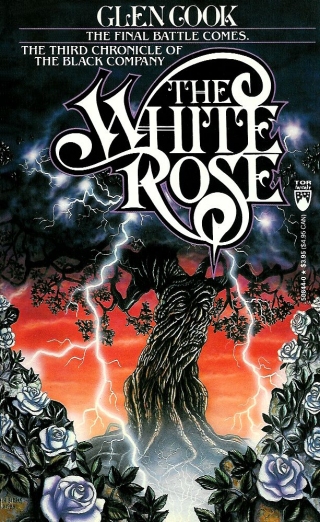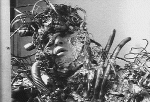
“I’m talking about the death of dreams, son. About losing the big, wild make-believes that keep you going. The impossible dreams. That kind of jolly pretend is dead. For me. All I can see is rotten teeth in a killer’s smile.”
This book completes the trilogy that makes the core of The Black Company. There are more books in the series (and I’ll probably get there at some point) but they go in their own separate ways. It took me an excessively long time to read this first segment as I prefer to shift focus over different series to have the broadest vision possible. Still, it’s been five years since I’ve read “Shadows Linger” and this means that, while my memory is decent, I can’t effectively compare these books to each other and can only give a general idea.
I remember that I loved the first book especially for its structure. I thought it was a straightforward, self-contained story with an open ending, but still wrapping up most things in a satisfying way. Each chapter was a cohesive whole, telling its own story, all then linked in a neat sequence so that each contributed to the overall arc, adding some meaningful elements. It was well organized and elegant, the story grew without becoming distracting and unwieldy, with a rather big battle at the end to cap it off with a nice climax. Book two instead shifted the tone, it mimicked more the structure and aims of a local and smaller horror story, but I appreciated that it was spun differently and that this second book didn’t end up formulaic. Overall less satisfying and epic, being a more limited and focused story, but having its own personality. And finally this third. I think there are a number of things that make this conclusion even better than the previous two, the one I’ve likely enjoyed the most. But having now finished it I admit that, while the finale “works”, it’s quite anti-climactic and it left me with a bland feeling, all in the span of a few pages. It definitely does not end on a high note, as if before reaching the last 30 pages the story grew, reached a certain height and acquired an excellent speed, but then right at the final push it suddenly lost all its momentum and made a rather clumsy and awkward landing. There’s nothing particularly wrong with it, or even a delusion of expectations, it actually manages to tie neatly the hanging threads, but it simply has no momentum. The final battle itself is the least interesting and inspired part of the whole book, as well of the whole trilogy. Everything cool happens before those last 30 pages, then it’s just about stuff happening in a predictable pattern, almost falling completely into cliche. There are a couple of nice touches here and there, the kind you expect from this writer, but the overall conclusion is forgettable.
This sours my impression because, as I said, this was the most fun and interesting book to read, of the three. But when you go through a relatively big arc, then an anticlimactic, predictable and bland conclusion can weaken the impression of everything that came before as well. It just sticks in your memory. So let’s talk a bit of the 90% of the good stuff that makes the book. The story jumps forward a number of years, offering again a new beginning and context. New environment, different threats, a few new characters. It serves to reestablish everything without forgetting what came before. As it develops it also serves as an in-character commentary on those events. This means that some interesting past events are slowly retrieved and rediscovered, linking them into the new narrative, and this is especially important for a last book in a trilogy. The need to look back and, hand with hand with the reader, pay homage to the times passed together. Not simply as a shallow celebration, since this rediscovery is also successfully integrated into plot. I was surprised to discover how some past events are given an interesting spin, some nice and unexpected plot twists and puzzles pieces that come together only in this book, building toward a cohesive overall arc. It’s with this third book that the story makes more sense as a trilogy, instead of just separate stories loosely linked together. I didn’t see this coming and it probably shows that Glen Cook had at least a plan to follow, whereas I thought that every new book was simply made “on the spot”, meaning that I thought he just went on writing a new book when he found some fuel, without a definite idea outside of the vague “White Rose” versus Lady/Dominator. This third book is again its own story and separate context, it more successfully links all the parts together, reproducing over the whole trilogy what the first book achieved within itself.
Another positive aspect is that, again as it was the case of book two, the structure of the book feels fresh and far from being just a retread. It pushes even more to the front the story within the story format, running it in parallel with the main one. This secondary a story happens in the past but is told as if it develops in the present, adding mysteries and interesting details that feed directly the main thread. It works like a PoV switch and it’s rather well handled by Cook, keeping the tension on both sides. This dual story progression goes on for most of the book and is probably the most successful part because after the cat is out of the bag everything starts to develop in more predictable ways and that’s where the story loses some of its spark. Structure-wise I’m rather satisfied, with the exception of the ending, that I’ve already commented. The context of the story is also something I enjoyed a lot. A Black Company that for too many years has been on the run and now is tired and battered, giving an even more sharpened edge to that world-weary and cynic style that is typical of Glen Cook (the quote at the top is an example).
I should mention the writing style. As usual Glen Cook has his own recognizable voice. The terse but straight to the point prose. This time I thought that a characteristic of this writer is that he doesn’t weaver. He’s not struggling and wrestling with the language in order to reach some height, or produce some intended effect in the reader. Every sentence is like a stone being placed. It is precisely what it is. One step after the other. There’s no stumbling or dragging. While most writers always oscillate between genius and failure, it’s like Cook is squarely in the middle. He knows exactly who he is and never falters. It gives a sense of self-control. And in this series it matches perfectly, or it fits perfectly, the personality of the narrator, Croaker. Who is, hearing what other readers usually say, what makes this original trilogy truly shine over the rest of the Black Company series. They just fit so well together, Cook and Croaker, that this makes the story even a more personal and authentic affair for the reader: because one connects to that voice and so shares the experience.
That style is also once again what makes the rather quirky setting “work” and feel at least somewhat plausible. This time it seems Cook just wanted to have fun, so we have (slowly) walking trees, teleporting menhirs, flying whales, and a few other non conventional fantasy elements. All this is described in that typical Cook style that means that stuff just is as it is, grounding those fancy elements as if there’s nothing peculiar about them (though he also provides an explanation for what is going on and why). You end up not thinking much at the absurdities, as they are part of the context as every other thing. Haven’t you seen enough weird stuff already?
Considering the trilogy as a whole, and the way this third book fits in, I’d suggest another reader to not follow my example and instead read it all in a relatively shorter time span. That would probably allow one to appreciate more how the story develops and the relationship with the characters, and maybe even enjoy the ending more than I did. The good thing about Glen Cook is that if you appreciate the kind of writer he is and the kind of stories he narrates, then any of his books will deliver on those expectations. A Malazan fan can also dig out an incredible number of influences and little things, and you can feel how much Erikson loved his work. As for me, I’ll likely continue at some point with the “Instrumentalities of the Night” series that, while requiring a greater effort and dedication, I still find more interesting and spinning things in a more original way.


3 Comments
I loved Cook’s Black Company novels and when I sttraed to read Erikson it was obvious where he took alot of his inspiration from.I never made it past the 1st Erikson novel though – tried 3x to read it and kept flapping back and forth between not giving a crap and not understanding WTF was going on.
I love the Black Company – however, it can be hard to ctinonue reading after the first set of books because some of the middle volumes are no longer in print and very difficult to find at reasonable prices. Now that Gollancz is doing omnibus editions I am hoping they get the rest of them out soon!
In regards to the two comments here above: apparently spam bots have now learned to write sensible comments.
I don’t know what to think…